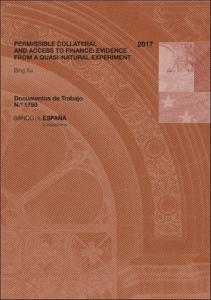Permissible collateral and access to finance : evidence from a quasi-natural experiment
Autor
Fecha de publicación
2-ene-2018
Descripción física
46 p. : tablas
Resumen
La reforma de la Ley de Propiedad transformó las transacciones aseguradas en China al permitir la utilización como garantías de una amplia clase de activos movibles. A través del método de «Diferencias en diferencias» se prueba que las compañías que operaban ex ante con más activos movibles expanden su acceso al crédito bancario e incrementan el vencimiento de su deuda. Sin embargo, no hay indicios de que la reforma mejore la eficiencia en la asignación del crédito, ya que la capacidad de endeudamiento de las empresas que son ex ante de baja calidad es la que más se amplía tras la reforma. Además, la expansión del crédito tampoco mejora los beneficios de las compañías. Estos resultados no son consecuencia de otros factores, como las mejoras en la protección de los derechos de los acreedores y de los derechos de propiedad. Nuestros resultados tampoco son consecuencia de otras importantes reformas contemporáneas a la aprobación de la reforma de la Ley de Propiedad. Estas incluyen reformas anti tunneling y de desdoblamiento de acciones y enmiendas a la estructura fiscal empresarial en China. También se realizan pruebas de robustez para estas otras reformas, contribuyendo con nuevos resultados a la literatura empírica sobre el proceso reformatorio en China
By allowing large classes of movable assets to be used as collateral, the Property Law reform transformed the secured transactions in China. Difference-in-differences test show firms operating with ex-ante more movable assets expand access to bank credit and prolong debt maturity. However, the reform does not seem to improve the efficiency of credit allocation, as debt capacity of ex-ante low quality firms expands the most following the reform. Credit expansion also does not lead to better firm performance. These findings are not driven by confounding factors such as improvements in creditor and property rights protection. Our results also cannot be explained by other important reforms which were introduced around the same time as the introduction of the Property Law. These include anti-tunneling and split-share reforms and amendments to the corporate tax structure in China. We conduct explicit robustness tests for these other reforms and hence contribute to the empirical literature on the reform process in China with new findings
By allowing large classes of movable assets to be used as collateral, the Property Law reform transformed the secured transactions in China. Difference-in-differences test show firms operating with ex-ante more movable assets expand access to bank credit and prolong debt maturity. However, the reform does not seem to improve the efficiency of credit allocation, as debt capacity of ex-ante low quality firms expands the most following the reform. Credit expansion also does not lead to better firm performance. These findings are not driven by confounding factors such as improvements in creditor and property rights protection. Our results also cannot be explained by other important reforms which were introduced around the same time as the introduction of the Property Law. These include anti-tunneling and split-share reforms and amendments to the corporate tax structure in China. We conduct explicit robustness tests for these other reforms and hence contribute to the empirical literature on the reform process in China with new findings
Publicado en
Documentos de Trabajo / Banco de España, 1750
Materias
Garantías; Activos movibles; Apalancamiento; Ley de Propiedad; Collateral; Movable assets; Leverage; Property law; Financiación de la empresa; Créditos; Regulación y supervisión de instituciones financieras; China
Aparece en las colecciones:












